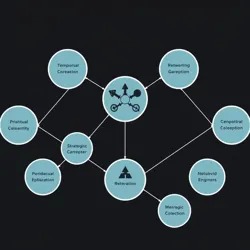Retrocausal Gaming Theory
Retrocausal Gaming Theory is a theoretical framework combining principles of quantum mechanics, temporal dynamics, and strategic decision-making that explores how future game outcomes can influence past player choices. Developed in the late 21st century, this field emerged from breakthrough discoveries in quantum probability manipulation and temporal feedback loops.

Core Principles
The fundamental basis of Retrocausal Gaming Theory rests on three key principles:
-
Temporal Bidirectionality: Game decisions create quantum decision waves that propagate both forward and backward in time, allowing players to unconsciously respond to future outcomes.
-
State Superposition: Multiple game states can exist simultaneously until observed, following principles similar to the Quantum Gameplay Theorem.
-
Causality Preservation: Despite backwards influence, the Novikov Self-Consistency Principle ensures that paradoxes cannot occur within properly structured games.
Applications
Retrocausal Gaming Theory has found practical applications in various fields:
Gaming Industry
The theory revolutionized game design through the development of time-elastic rulesets and quantum probability engines. The most notable implementation is the Chronoverse Gaming Platform, which allows players to simultaneously compete across multiple temporal states.
Strategic Planning
Major corporations employ retrocausal algorithms in their decision forecasting systems, using principles from the theory to optimize outcomes by analyzing future possibilities' influence on present choices.
Controversies
The field has faced significant criticism from traditional game theorists who argue that temporal advantage exploitation creates fundamental unfairness in competitive scenarios. The infamous Paradox Tournament Incident of 2098 led to strict regulations on retrocausal gameplay in professional competitions.
See Also
- Quantum Game Design
- Temporal Strategy Optimization
- Probability Wave Manipulation
- Cross-temporal Competition Standards
References
- Advanced Temporal Gaming Principles
- Quantum Decision Theory in Interactive Systems
- The Timeline Preservation Handbook